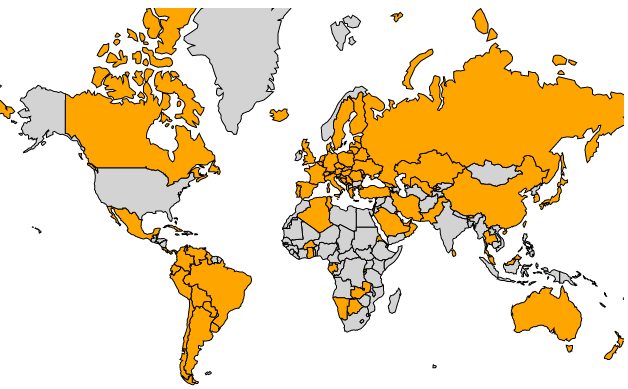
Countries with some form of universal healthcare in orange.
“One of the worst things is you can’t tell if people are smiling.”
“Well, I’m smiling,” I said, from behind my mask. “Hope you have a good day. And thanks.”
“Oh, I will. At least I have a job.”
I’ve got one, too. But my co-workers and I are working from our homes, unlike the checker at Fresh Market, who’s on the front lines, toiling with rubber gloves and a mask behind a plastic shield. But, truth be told, all of us who are still working in this current situation are lucky.
The economy is tanking. At last count, 26 million Americans had filed for unemployment. And for many of those folks, no job means no health-care insurance. Which means they’ve joined the approximately 44 million other Americans who have no health insurance — in the middle of the worst health crisis in memory. A Gallup poll released this week reported that one in seven Americans wouldn’t seek care for coronavirus symptoms due to worries about the possible cost of treatment.
Nationally, COVID-19 crisis “management” is still an unholy, disorganized mess. While steps are being taken in some states to “reopen the economy,” just across a border, another state is still battened down. Germs don’t recognize borders, last I heard. But coherent leadership from the top of the political food-chain is quite obviously not going to happen. Or coherent anything, for that matter.
Most indications are that things won’t truly return to “normal” until a vaccine is discovered, and that’s likely many months away. Most projections I’ve read predict a second surge of the virus. It could happen soon, if we reopen the economy too fast. It could happen this fall, even if we bring down the infection rate this summer. Everyone appears to be shooting in the dark to some extent.
What we do know is that in two months, nearly 60,000 Americans have died. And that’s just the official number. Higher general death rates in some parts of the country suggest that many probable COVID deaths have not been attributed to the disease.
I was chatting with a group of journalists via Zoom this week. There was some talk about covering “other stories” besides the virus, but the fact is there is almost no story you can report on that isn’t impacted by the COVID crisis: politics, education, government, voting rights, food, the arts, sports, social justice, wage and income disparity — you name it.
Unsurprisingly, as Maya Smith reports in this week’s cover story, the disadvantaged among us — the poor, the homeless, the undocumented, certain African-American communities — are disproportionately affected by COVID. It’s an eye-opening story.
And those folks’ lack of access to health care affects everyone, even those fortunate enough to have it. More people walking around with the disease means more people getting infected, which sustains the shutdown and stay-at-home orders. If millions of Americans can’t get — or can’t pay for — medical care, all of us pay the price.
If there’s an upside to all of this, it’s that it’s given us a chance to see what’s truly broken, to understand what needs to be changed to get this country back on track. COVID has exposed major faultlines in our civic and social foundations. We have a long list of problems and disparities that need to be addressed. But at the top of that list is health care.
What the United States calls a health-care system is an insult to the word “system.” It’s bloated, inequitable, inefficient, greed-driven, and unsustainable. The current situation has made that blindingly clear. Vast numbers of Americans are one medical crisis away from bankruptcy. Vast numbers of Americans avoid seeking medical care because they can’t afford it. In so doing, their treatable conditions become emergency room crises, their deaths are often premature and unnecessary, and their communicable illnesses needlessly infect others.
Assuming some sort of electoral purging of the current power structure happens this November — a big assumption, I know — Job One has to be fixing health care. The United States is the only — only! — first-world country that doesn’t provide some sort of universal health care for its citizens. No one goes bankrupt due to a medical bill anywhere else in the civilized world. Nowhere else do people avoid seeing a doctor because they can’t pay for it. Health care is the most essential and basic human right. And if anyone is concerned about the “cost,” remind them of the $5.6 trillion (and counting) the federal government has just thrown at the economy in the past month.
We may be wearing masks for a while longer, but it’s time to take off the blinders.